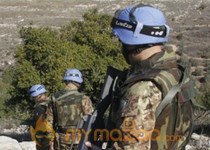Rocket fire from Lebanon hit northern Israel Friday, a move that has led Israeli officials to suspect Lebanese militants may be joining the four-day conflict between Israel and Gaza militants.
The Lebanese military said three rockets were fired toward Israel around 6 a.m. and the Israelis retaliated by firing about 25 artillery shells on the area. Israeli military spokesman Lt. Col. Peter Lerner confirmed that the Israeli military had responded to the new attack with force.
Lebanese troops and United Nations peacekeepers later began searching the area, and the military said it was trying to find out who was behind the attack.
Lerner said Israel has suspected that Lebanese militants may try to join the fray as Israel exchanges fire with Islamic Hamas militants in Gaza. However, he said it was still unclear whether Friday's attack was "symbolic or something more substantial."
Southern Lebanon is a stronghold of the Shiite militant group Hezbollah, which has battled Israel numerous times. However, recent fire from Lebanon has been blamed on radical Palestinian factions in the area and Hezbollah has not been involved in the ongoing offensive. It has largely refrained from engaging Israel since a monthlong war in 2006 when it fired thousands of rockets into Israel and was pummeled by Israeli airstrikes in response.
The Jerusalem Post cited senior Israeli officials who also claimed the rocket was not fired by Hezbollah, but by a small radical organization in Lebanon.
The attack came as Gaza rocket fire struck a gas station and set it on fire Friday in southern Israel
The explosion in Ashdod sent plumes of smoke high into the air. Israeli health officials said the blast wounded three people, including one in serious condition. Rocket fire continued in earnest from Gaza toward various locations in southern Israel.
Gaza militants already have fired more than 550 rockets against Israel in the four-day offensive. Israel's "Iron Dome" defense system has intercepted most of those aimed at major cities but some have slipped through.
One such rocket struck the gas station in Ashdod, leaving a trail of charred vehicles in its wake. The attack looked to be the most serious in the four days of fighting that has yet to kill anyone on the Israeli side. Israeli military attacks on Gaza have killed at least 95 people, including dozens of civilians.
Frequent air raid sirens sounded across Israel on Friday, including for the first time in the northern city of Haifa. Israel has shot down at least 110 incoming rockets thus far.
Israel launched the Gaza offensive to stop incessant rocket fire against it. The Jerusalem Post, citing a senior Israeli security source reports that the Israeli Defense Forces has so far struck 1,100 targets belonging to Hamas and other groups in the Gaza Strip since the start of the operation launched Monday to end rocket attacks from Gaza , and 210 targets over the past 24 hours.
In Gaza, an Israeli airstrike Friday hit the home of a well-known Islamic Jihad leader. Gaza health officials said five people were killed in the strike.
Lerner said the military was doing its utmost to prevent civilian casualties, calling inhabitants ahead of time to warn of an imminent attack. He said Israeli forces also fire "non-explosive munitions" at roofs as a warning and looks for people to leave before destroying a structure.
Lerner blamed Hamas for the death of innocent bystanders by firing from heavily populated areas.
Israel's military "uses its weapons to defend its civilians. Hamas uses its civilians to defend its weapons," he said.
With Hamas on its heels, Israeli leaders were still mulling whether to launch a ground assault in Gaza to deliver what they hope could be a decisive blow. Such a move, though, would likely involve a rise in Palestinian civilian casualties and put Israeli troops at risk as well.
Israel has mobilized more than 30,000 reservists to supplement the potential ground operation.
Amos Yadlin, a retired general and former head of military intelligence, said Israel already re-established a deterrent factor against Hamas and should offer a cease-fire and aim to wrap up its campaign in the coming days.
"If the Israeli offer is turned down, Israel will refill its stock of legitimacy in such a way that will enable a significant expansion of the objectives and scale of the operation," he wrote in a column published Friday in the Yediot Ahronot daily newspaper. "Hamas has taken severe blows since the start of the round of violence and has failed in almost every step it took. ... However, one rocket that hits an Israeli population center will be enough to change the picture completely."







